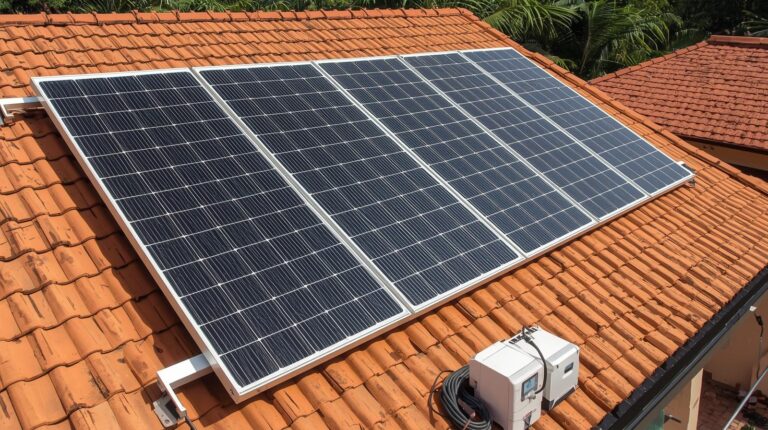Imagine a world where every home and building is equipped with solar panels, creating a decentralized solar power grid integration. Picture the resilience and reliability this would bring, reducing dependence on traditional energy sources and mitigating transmission losses. With enhanced local energy independence, flexibility in energy distribution, and the potential for cost savings, decentralized power grid integration offers a promising alternative. In this article, we will explore the advantages of this innovative approach, shedding light on a brighter and more sustainable future for all.
⚡ Stay Powered When the Grid Goes Down
What if you could keep lights, devices, and even critical systems running during any blackout? That’s exactly what Dark Reset shows you how to do—using simple, proven methods. Discover lots of ways to prepare for energy independence.
Key Takeaways
- Increased grid stability and reliability
- Reduced transmission losses
- Enhanced local energy independence
- Flexibility in energy distribution
- Potential for cost savings
Increased Resilience and Reliability
Increase the resilience and reliability of your solar power grid through decentralized integration. By adopting a decentralized approach to solar power grid integration, you can enhance grid stability and ensure a reliable supply of renewable energy.
Traditional centralized power grids are susceptible to disruptions, such as equipment failures or natural disasters, which can lead to widespread power outages. However, with decentralized integration, power generation is distributed across multiple smaller units, reducing the impact of any single point of failure. This decentralized model allows for more efficient use of resources and promotes greater system resilience.
Additionally, by integrating renewable energy sources like solar power into the grid, you can reduce dependence on fossil fuels, contributing to a more sustainable and environmentally friendly energy system. Embrace decentralized integration to strengthen your solar power grid and enhance grid stability while incorporating renewable energy sources.
Reduced Transmission Losses
By adopting a decentralized approach to solar power grid integration, you can significantly reduce transmission losses. This means that more of the solar energy generated is efficiently delivered to end users, resulting in improved efficiency and overall system performance.
Here are three reasons why reducing transmission losses through decentralized solar power grid integration is beneficial:
- Minimizes energy waste: By bringing solar power generation closer to consumers, the need for long-distance transmission is reduced, leading to lower energy losses during transportation.
- Enhances grid stability: Decentralized solar power integration helps distribute generation capacity across the grid, reducing strain on transmission lines and improving the overall stability and reliability of the system.
- Environmental benefits: By reducing transmission losses, less energy is wasted, resulting in a lower carbon footprint and contributing to a more sustainable and environmentally friendly energy system.
Enhanced Local Energy Independence
To further strengthen the advantages of decentralized solar power grid integration, you can enhance your local energy independence by diversifying your energy sources and reducing reliance on centralized power systems.
By implementing decentralized solar power grids, you empower your community to take control of their energy production and consumption. This reduces the dependence on traditional utility companies and fosters a sense of empowerment and self-sufficiency.
Moreover, decentralized power grid integration promotes environmental sustainability by utilizing clean, renewable energy sources. By generating electricity locally through solar panels, you reduce the need for long-distance transmission, minimizing transmission losses and associated environmental impacts.
This not only benefits your community but also contributes to the overall reduction of greenhouse gas emissions. Embracing decentralized power grid integration is a step towards a more sustainable and resilient energy future for your community.
Flexibility in Energy Distribution
You can achieve greater flexibility in energy distribution by implementing decentralized power grid integration. This approach allows for energy sharing among different nodes in the grid, enabling a more efficient and reliable distribution of electricity.
Here are three key advantages of decentralized solar power grid integration:
- Improved grid stability: By distributing solar power generation across multiple locations, the grid becomes less susceptible to disruptions caused by single points of failure. This enhances the overall stability and reliability of the grid, ensuring a continuous supply of electricity.
- Increased resilience: Decentralized solar power grid integration promotes resilience by reducing dependency on centralized power plants. In the event of a power outage or natural disaster, local solar installations can continue to generate electricity, providing energy to critical infrastructure and households.
- Local empowerment: Implementing decentralized power grid integration empowers local communities, allowing them to generate and distribute their own renewable energy. This fosters a sense of belonging and ownership, as individuals become active participants in the energy transition.
Potential for Cost Savings
Implementing decentralized power grid integration offers the potential for cost savings through increased efficiency and reduced reliance on traditional energy sources. By integrating solar power systems at a local level, communities can reduce transmission losses that occur when electricity is transported over long distances. This increases the overall efficiency of the grid and helps to lower costs.
Additionally, decentralized power grid integration allows for the utilization of unused or underutilized spaces, such as rooftops and vacant land, reducing the need for costly land acquisition. Moreover, the cost-effective implementation of decentralized solar power grids can provide economic feasibility for regions with limited access to centralized power grids. This approach enables communities to become more self-sufficient in meeting their energy needs while also reducing their dependence on fossil fuels.
Conclusion
Decentralized solar power grid integration offers numerous advantages such as increased resilience and reliability, reduced transmission losses, enhanced local energy independence, flexibility in energy distribution, and potential cost savings. But have you ever wondered how this decentralized approach can revolutionize the way we generate and distribute energy? By harnessing the power of the sun and distributing it locally, we can create a more sustainable and efficient energy system.
⚡ Stay Powered When the Grid Goes Down
What if you could keep lights, devices, and even critical systems running during any blackout? That’s exactly what Dark Reset shows you how to do—using simple, proven methods. Discover lots of ways to prepare for energy independence.




